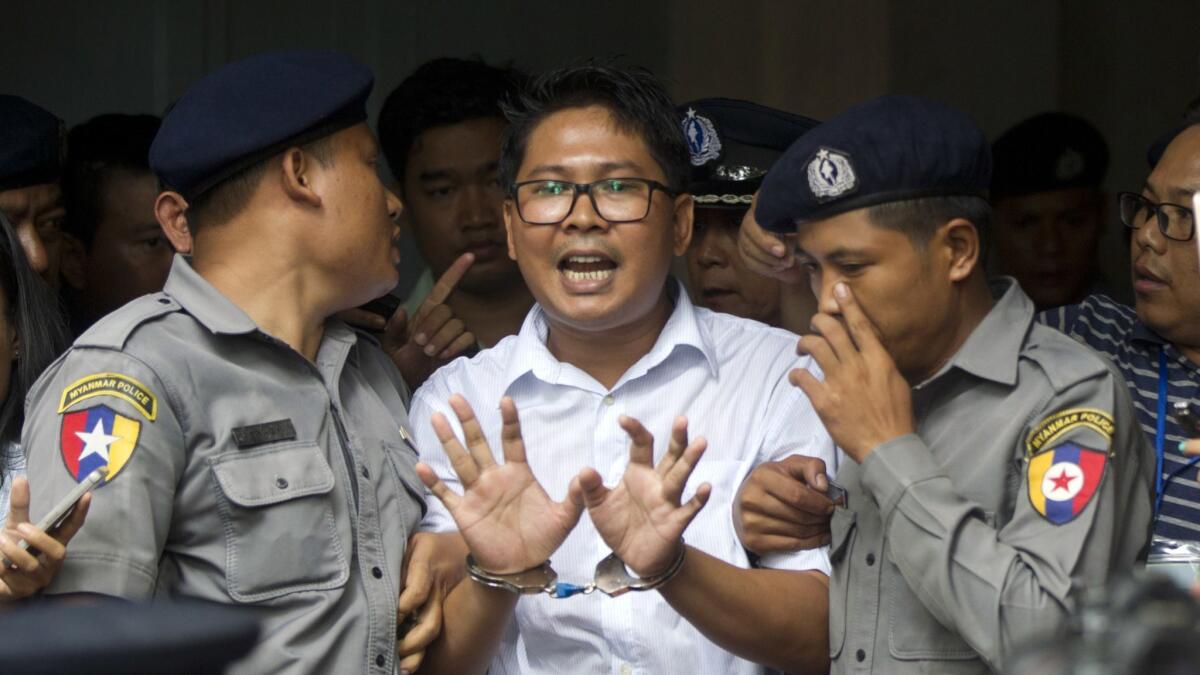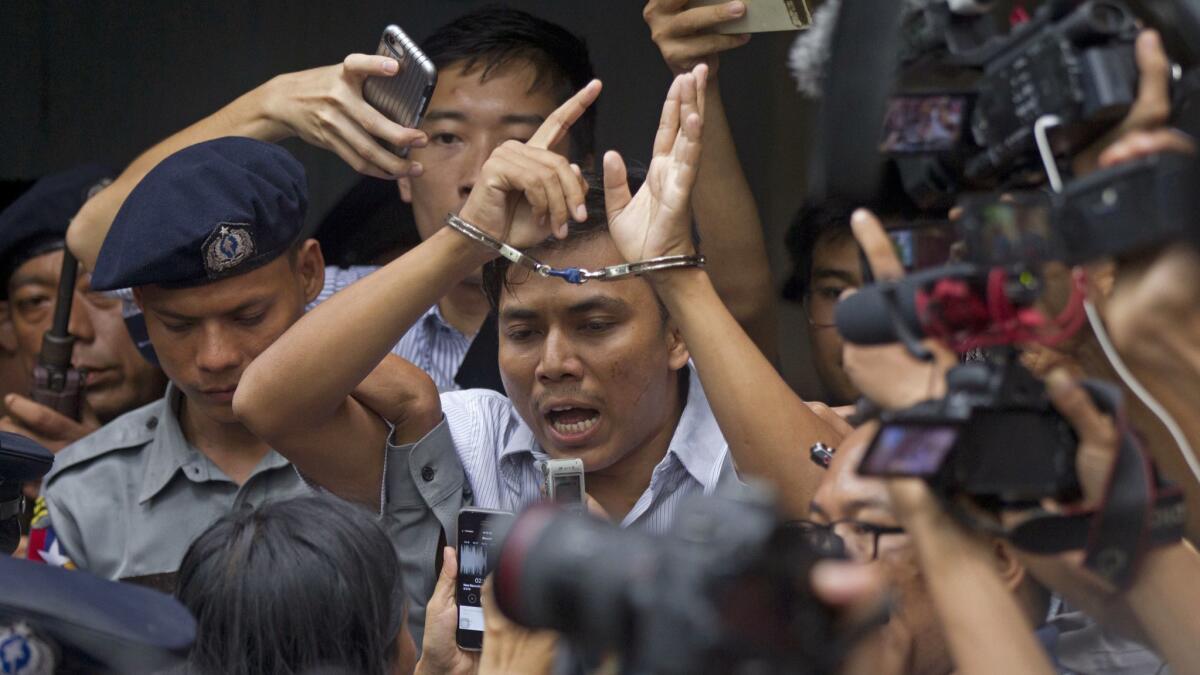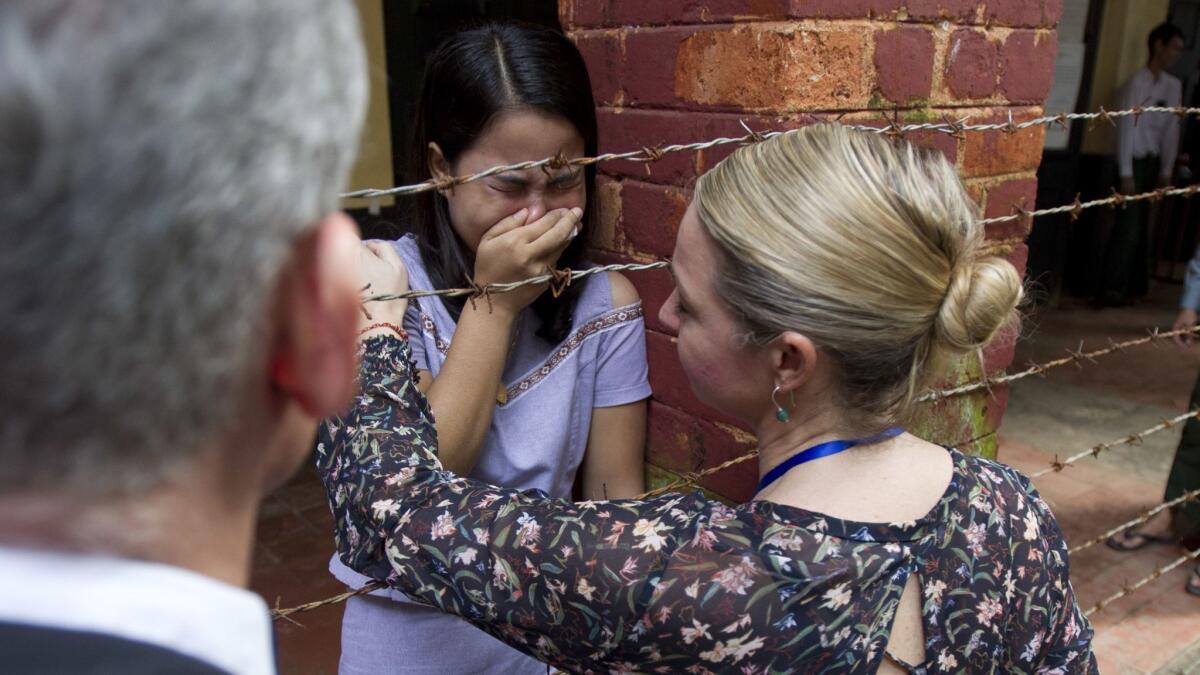Reuters journalists sentenced to 7 years in prison for investigating massacre of Rohingya Muslims

- Share via
Reporting from YANGON, Myanmar — Two Reuters journalists in Myanmar were convicted Monday under a colonial-era state secrets law and sentenced to seven years in prison for investigating the army’s attacks against Rohingya Muslims, in a case widely seen as a test of the country’s commitment to democracy after half a century of military rule.
Foreign diplomats, human rights groups and press freedom advocates condemned the verdict, which signaled that Myanmar authorities were determined to muzzle independent reporting on the violence that has forced more than 700,000 Rohingya to flee to neighboring Bangladesh since August 2017.
The journalists, Wa Lone and Kyaw Soe Oo, Myanmar nationals who work for the Reuters international news agency, were investigating a massacre in the village of Inn Din in northern Rakhine state when police arrested them in December.
In what court testimony indicated was a plot to entrap the reporters, police officers had invited the men to a meeting at a restaurant outside Yangon, Myanmar’s largest city, and handed them documents purportedly linked to the army campaign in Rakhine.
The reporters were convicted under the 1923 Official Secrets Act, which imposes harsh punishment for obtaining government documents that could be “useful to an enemy.” They had pleaded not guilty to the charges.
Reuters later published an extensive report on the killings at Inn Din, citing eyewitnesses who said that Myanmar soldiers and Buddhist villagers executed 10 Rohingya men and buried them in a single shallow grave.
The story said that Wa Lone and Kyaw Soe Oo had traveled to the village and found “a newly cut trail leading to soft, recently disturbed earth littered with bones.” Independent forensics experts reviewed photos of the site and told Reuters they saw human remains, including part of a spinal column, ribs and other bones.

“These two admirable reporters have already spent nearly nine months in prison on false charges designed to silence their reporting and intimidate the press,” Reuters President Stephen J. Adler said in a statement.
“Without any evidence of wrongdoing and in the face of compelling evidence of a police setup, today’s ruling condemns them to the continued loss of their freedom and condones the misconduct of security forces.”
A lawyer for the reporters, Khin Maung Zaw, said they would appeal the convictions.
“Today’s verdict is a disappointment not only for the accused but for all of us, for the lawyers, for the press, for the people of the whole country,” he said.
The message from Myanmar authorities to journalists and others was clear, he added: “Hold your tongues. Don’t say anything. Do not be inquisitive.”
In brief remarks outside the courthouse in Yangon before police hauled him away, Wa Lone said: “I have no fear — I believe in justice, democracy and freedom.”
The U.S. Embassy in Myanmar criticized the “clear flaws” in the case and said the verdict “is a major setback to the government of Myanmar’s stated goal of expanding democratic freedoms.”
The U.S. ambassador to Myanmar, Scot Marciel, who was in the courtroom on Monday and has closely followed the case, said the convictions were “deeply troubling for everybody who has struggled so hard here for media freedom.”
Also present for the verdict were the wife and young daughter of Kyaw Soe Oo, 28. The wife of 32-year-old Wa Lone delivered a baby girl, Thet Htar Angel, three weeks ago and was not in the courtroom.
Although their case has drawn global attention, the journalists have received little sympathy within Myanmar, where the overwhelming Buddhist majority generally supports the military campaign against the Rohingya.

Many Buddhists — echoing state propaganda — regard the Rohingya as Bangladeshis who migrated illegally to Myanmar, even though many Rohingya families trace their roots here back several generations.
Decades of systematic persecution of the Rohingya in Myanmar — also known as Burma — culminated with the onset in August 2017 of a systematic, military-led campaign of arson, lootings, rape and mass executions that international experts have compared to genocide.
Last week, the United Nations’ top human rights body took the unusual step of naming six top Myanmar military officials who it said should face genocide charges.
Aung San Suu Kyi, the Nobel Peace Prize laureate who led the long struggle against military rule and is now in charge of Myanmar’s first democratically elected government, has faced withering criticism for defending the army’s actions. Her National League of Democracy party, filled with aging activists, has proved unable to implement many of the reforms needed to transform one of Asia’s poorest states.
Under a deal the army made to relinquish some of its powers, the generals still retain authority over security matters. But human rights groups say that Suu Kyi’s silence has emboldened army leaders to carry out atrocities.
The Burma Human Rights Network said in a statement that the verdict “signals another failure by the National League of Democracy administration to protect human rights and press freedom in Burma, and stands in stark contrast to the impunity enjoyed by the military for the crimes that these reporters exposed.”
Special correspondent Diamond reported from Yangon and Times staff writer Bengali from Mumbai, India.
Shashank Bengali covers South Asia for The Times. Follow him on Twitter at @SBengali
UPDATES:
8:14 a.m.: The article was updated with staff reports.
This article was originally published Sept. 2 at 9:45 p.m.
More to Read
Sign up for Essential California
The most important California stories and recommendations in your inbox every morning.
You may occasionally receive promotional content from the Los Angeles Times.














